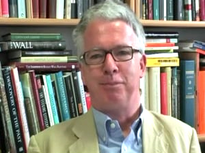Peter - Interview 36

In 2000 Peter was diagnosed with a very rare form of pancreatic cancer, a neuroendocrine tumour. He had chemotherapy followed by a distal pancreatectomy, splenectomy, and removal of tumour from portal vein. Since then he has been well.
Peter is a journalist. He is married and has two children. Ethnic background/nationality: White British.
More about me...
In the late 1990’s Peter started to have pains in his lower abdomen. that would come and go. It felt as though some kind of poison was being injected into his body. The pain might start at 7.00 p.m. and continue until about 3.00 a.m. the next morning. It seemed to come ‘out of the blue’. These pains occurred very occasionally for several years. He had no other symptoms.
Peter had a neuroendocrine tumour (a rare pancreatic cancer). He had bouts of severe abdominal pain for years before he found out what was wrong.
Peter had a neuroendocrine tumour (a rare pancreatic cancer). He had bouts of severe abdominal pain for years before he found out what was wrong.
Peter says it's important to be aware that doctors all have different skills and interests. They might not be able to spot pancreatic cancer quickly.
Peter says it's important to be aware that doctors all have different skills and interests. They might not be able to spot pancreatic cancer quickly.
After first being told he did not have cancer, Peter was told he had a neuroendocrine cancer and that he had only months or a few years to live.
After first being told he did not have cancer, Peter was told he had a neuroendocrine cancer and that he had only months or a few years to live.
Peter told friends that he had a rare type of cancer and that although his prognosis was bad his type of pancreatic cancer was less bad than others.
Peter told friends that he had a rare type of cancer and that although his prognosis was bad his type of pancreatic cancer was less bad than others.
Peter had streptozocin, fluorouracil and adriamycin to shrink his tumour. He found it hard to move his limbs, had an infection and his hair fell out.
Peter had streptozocin, fluorouracil and adriamycin to shrink his tumour. He found it hard to move his limbs, had an infection and his hair fell out.
Epicurus recommended that people should manage pain by imagining past scenes of pleasure. Peter dealt with his pain in this way.
Epicurus recommended that people should manage pain by imagining past scenes of pleasure. Peter dealt with his pain in this way.
Peter's treatment finished 10 years ago. Since then he has seen two consultants every six months for check-ups, which include blood tests and scans.
Peter's treatment finished 10 years ago. Since then he has seen two consultants every six months for check-ups, which include blood tests and scans.
When you go back to the oncologist, what does he do? Does he take blood tests? Or, or what?
Yes I have a battery of blood tests, that last you know twenty or thirty odd blood tests just, just to check all the various…
Before his diagnosis Peter knew nothing about the pancreas, and he found it very hard to find out about neuroendocrine tumours.
Before his diagnosis Peter knew nothing about the pancreas, and he found it very hard to find out about neuroendocrine tumours.
But we then began to learn a whole lot of aspects about an organ, the pancreas, the curious thing about the pancreas is until you have anything wrong with your pancreas you’ve really no idea that you have a pancreas. It’s a very mysterious little creature indeed, it was one of the last you know, you discover that it was one of the organs that we last learnt anything about. It was one of the most mysterious little creatures that live inside us, you know, full of islands and exuding and seeping and controlling hormones, and insulin and it’s the sort of, and its deep you know, it sort of, like a little fish swimming around in there. And it’s quite deep, and it’s a fish that stays a long way under water, and it’s quite hard to catch and not easy to do anything with. And it’s connected to your liver by its various veins, portal veins and splenic veins, and all sort of things.


